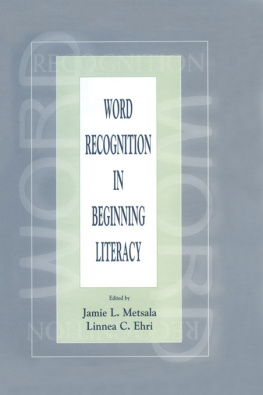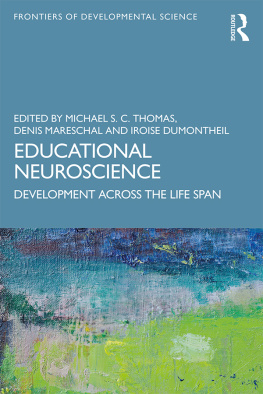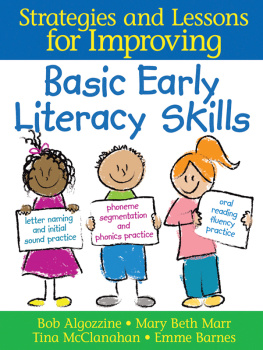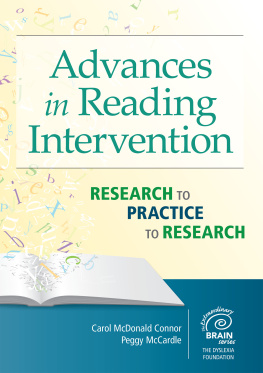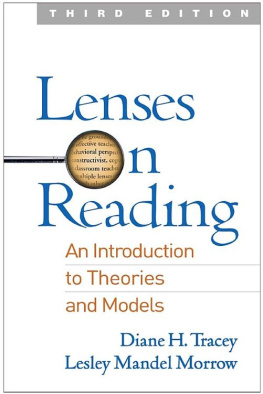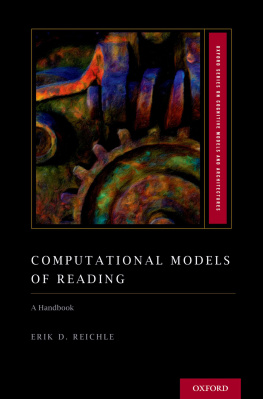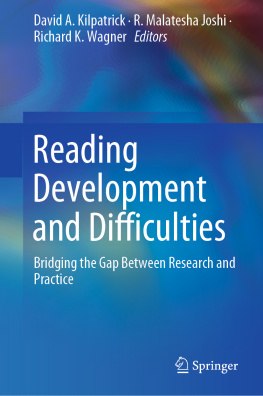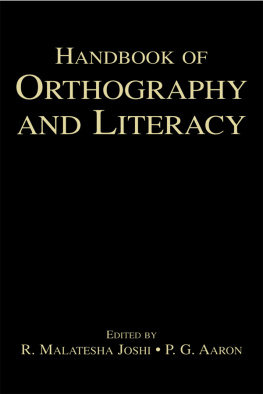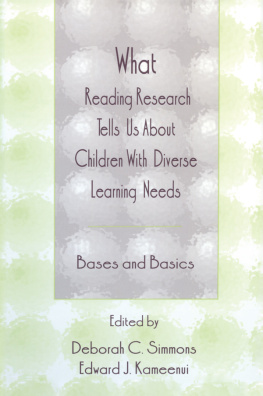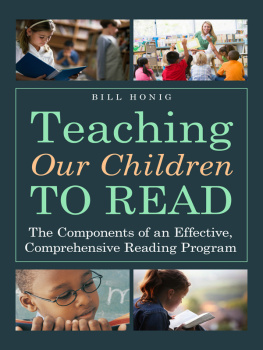
Word Recognition in Beginning Literacy
Word Recognition in Beginning Literacy
Edited by
Jamie L. Metsala
University of Maryland
and
Linnea C. Ehri
CUNY Graduate Center

Copyright 1998 by Lawrence Erlbaum Associates, Inc.
All rights reserved. No part of the book may be reproduced in any form, by photostat, microform, retrieval system, or any other means, without prior written permission of the publisher.
First published by:
Lawrence Erlbaum Associates, Inc., Publishers
10 Industrial Avenue
Mahwah, NJ 07430
This edition published 2011 by Routledge:
Routledge
Taylor & Francis Group
711 Third Avenue
New York, NY 10017
Routledge
Taylor & Francis Group
2 Park Square, Milton Park
Abingdon, Oxon OX14 4RN
Cover design by Kathryn Houghtaling Lacey
Library of Congress Cataloging-in-Publication Data
Word recognition in beginning literacy / edited by Jamie L.
Metsala and Linnea C. Ehri
p. cm.
Includes bibliographical references and index.
ISBN 0-8058-2898-2 (cloth : alk. paper). ISBN 0-8058-2899-0 (pbk. : alk. paper)
1. Word recognition. I. Metsala, Jamie L. II. Ehri, Linnea C.
LB1050.44.W67 1998
372.462dc21
9740338
CIP
Contents
Preface
This edited volume grew out of a conference sponsored by the National Reading Research Center, funded through the Office of Educational Research and Improvement by the U.S. Department of Education. The purpose of the conference was to bring together beginning reading experts from the fields of education and the psychology of reading and reading disabilities so that they could present and discuss their research findings and theories about how children learn to read words, instructional contexts that facilitate this learning, background experiences prior to formal schooling that contribute, and sources of difficulty in disabled readers. Presenters wrote drafts of their chapters prior to the meeting; these were read by others and discussed at the meeting, and revisions were written to produce this volume.
Chapters in present studies of word recognition in the context of the early home environment, and also examine several beginning reading programs in the classroom. Also, the principles that make early literacy instruction motivating to students are addressed, and the impact of early reading success on later reading habits are examined.
Ehri () begins by identifying the processes that develop as beginners learn to recognize written words. Ehri considers the different ways that words might be read and proposes a detailed developmental model, including the role of alphabetic processes and spelling knowledge in acquiring mature word recognition skills. Ehri emphasizes that although a method of instruction is not prescribed herein, it is paramount to take into consideration the cognitive and linguistic processes to be targeted in such instruction.
Goswami examines the importance of spelling patterns that correspond to rhymes in the spoken language on childrens reading acquisition (this a functionally important unit for beginning readers. Goswami compares the reading acquisition processes involving rhyme across a number of languages, and concludes with a section on how to incorporate the importance of rhyme units into classroom instruction.
Stahl and Murray extend the discussion of phonological awareness skills and address how these interact with basic reading skills in word recognition (). These authors first examine the multidimensional aspects of phonological awareness skills because research has accumulated to expose earlier notions as too simplistic. A new and more detailed model of the role of these phonological awareness skills in acquiring skilled word recognition is proposed.
In , Metsala and Walley examine aspects of spoken language growth that may be prerequisites to phonological awareness skills. These authors argue that the phoneme emerges first as a perceptual processing unit that results from growth in vocabulary size and structure, and only later emerges as a unit that can be accessed and manipulated in awareness and reading tasks. Walley and Metsala present a model suggesting the seeds from which phonemic awareness develops.
In the following chapter, Brown argues that one can achieve a different kind of understanding of the endpoint of the reading process if one adopts the adaptive analysis approach that has recently received wide attention in other areas of psychological research, such as memory and perception. According to this approach, skilled adult processing is seen as an optimal processing strategy, given the statistical nature of the task at hand (). Brown shows that this approach can be used to understand a number of core issues in the study of adult skilled reading, and he discusses the potential of such approaches for understanding the word recognition acquisition process.
Siegel begins ). She examines how phonological processing deficits are manifested in reading disabled children across different languages. Siegel also discusses the modularity of phonological processes and their role in word recognition development in disabled readers.
Torgesen and Burgess expand the discussion of reading-related phonological processes across the earliest years of reading acquisition (). These authors examine whether reading-related phonological processes show sufficient stability across early reading development to qualify as a proximal cause of reading disabilities. Three reading-related phonological processes are identified, phonological awareness, short-term phonological memory, and rapid automatic naming. The relationship between these three processes and measures of reading ability over the period of early reading acquisition are reported. Torgesen and Burgess discuss the practical applications of their findings for diagnoses and intervention for reading disabled children.
In the questions of how these instructional programs can establish foundation skills in phonological and orthographic processing, and how they can ensure that these skills are integrated and applied to reading in context.
). Gaskins outlines the specific forms of word knowledge that the students at Benchmark School appear to lack and then how the literacy instruction is targeted at these specific knowledge deficits. Gaskins theory of instruction builds strongly on targeting the cognitive processes outlined in previous chapters.
In ). These authors present a longitudinal investigation relating widening achievement disparities to differences in cumulative print exposure. Cunningham and Stanovich provide evidence that early success in beginning reading acquisition affects lifetime reading habits.
Baker, Fernandez-Fein, Scher, and Williams extend the context of examining reading development to include early home experiences (). Baker and her colleagues examine home experiences such as book reading and environmental print reading, with a focus on defining effects on the childs development of print knowledge and phonological awareness. These authors also examine sociocultural differences in home experiences related to word recognition and implications from their findings are briefly discussed.
Contributors of previous chapters briefly mention the importance of spelling in the development of reading and literacy. Treiman expands on this and presents evidence that supports the incorporation of spelling instruction into beginning reading instruction (). Treiman examines the spelling properties of the English orthographic system and childrens spelling development within this orthographic context. Treiman argues that spelling instruction benefits both phonemic awareness and learning to read. A focus on approaches to spelling instruction in the early years concludes her chapter.
Next page
